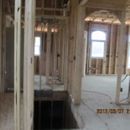Who pays for fixing builder error?
I am building a house and I gave the builder the floor plan of house I wanted. I signed off on the plan, not knowing how to read a blueprint, not realizing the builder changed the entrance to the basement from my kitchen to entrance to the basement from my foyer. Also the arch from the foyer was to be wall-to-wall, it looks like an entrance from the foyer.
I requested the wallsbe torn down and redone. He is saying they can’t remove the walls, as one wall has electrical wiring and the other wall has air vents, and to fix the arch in the foyer he wants me to pay for it. I am adamen, since they made the error and I was not told of the changes, they are responsible for fixing it.
Please advise. If he won’t fix it, should I hire a lawyer?
GBA Detail Library
A collection of one thousand construction details organized by climate and house part










Replies
Burma,
We can't determine who is right and who is wrong from the information you provided. In most cases, when miscommunication happens during a building project, both sides share some of the blame.
Of course, you can always hire a lawyer to review your construction documents and provide legal advice. One thing you can be sure of: hiring a lawyer costs more than not hiring a lawyer. In many cases, pursuing legal remedies costs more than negotiating a solution with your builder.
As I'm sure you are aware, saying "I didn't know what I was signing" isn't much of a defense when you appear in court. In the future, remember: when you are asked to sign a legal contract, it doesn't make much sense to sign the document if you don't understand what you are signing.
Good luck.
are the changes for sure listed on the plans or were they changes in the field?
Assuming they are on the plans, unfortunately there is not much you can do. Many budget overages on residential projects are due to similar situations. Many home owners do not always understand plans, or understand exactly what they are looking at. When they finally become real and "3d", some cases it is not what the owner thought they were getting, thus a change order. As Martin said, legal action should be a last resort, and something like you described would be a certain waste of your money and a massive waste of time. Try talking with him about the changes and see if you can meet in the middle.
It sounds like you aren't visiting the jobsite often enough. If the walls were framed to the wrong layout, and you didn't see it until after mechanical and electrical were roughed in... that's too long. It might have been an easy change if you had caught it as soon as the framing was done.
You admitted you do not know how to read plans so you do not know if it is a "builder error" or not.
Hire someone who can read plans for a couple hours. Another builder or architect is much cheaper than alawyer. Visit the home with them and determine if the builder built to the SIGNED plans.
If he did, its your error and the changes will be on your dime. If the builder made changes from the SIGNED plans without getting you to sign change order, then it is builders error and he should make change at his expense.
It might not be that simple. Clients give builders changes all the time, verbally, without putting anything in writing or revising the plans.
Depending on which state you are in, a verbal order without written backup may be non-binding and not recognized by a court of law (or contractor board) as valid. That's the way it is in MN, where anyone becoming a general contractor learns that "there are no verbal agreements." Regardless of the state, you should read the contract to see if the contractor included a statement to that effect, as I do in my contracts.
Show your contract paper to your legal adviser for further action. He/she is the ideal person to determine your next action. Research well and take your state's industry leader's opinion in this matter.